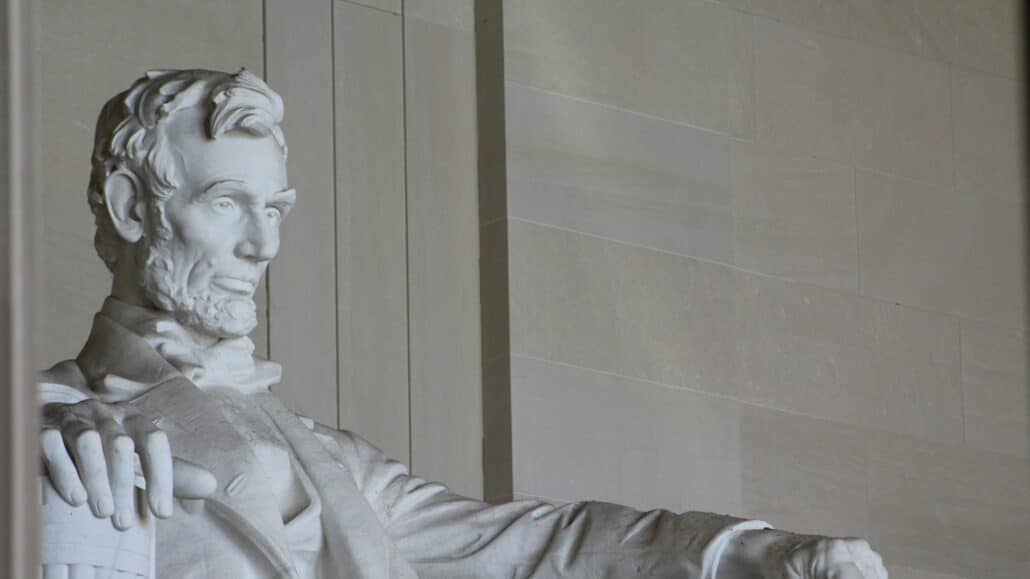Pope Francis mentioned four prominent Americans during his address to Congress on September 24, 2015. Three of these Americans—Dorothy Day, Thomas Merton, and Martin Luther King Jr.—seemed to be obvious choices as all three were significant religious leaders. Why Francis selected the fourth person, Abraham Lincoln, is less clear.
Lincoln may be the most popular American of all time. More books have been written about him than all other presidents combined. Yet Lincoln hardly was religious. Rivals denounced him as an atheist. He was not much of a churchgoer. Historians claim that Lincoln thought of God only after the burdens of the country and the horrors of the Civil War drove him to his knees.
Lincoln certainly seems to be an odd choice for Pope Francis. A close look into their lives nonetheless reveals that in at least three areas, Pope Francis and President Lincoln may share the same spirit: both men bore pain in a similar way, both allowed themselves to be surprised by God, and both responded to suffering with mercy.
Painful Lives
Both Lincoln and Francis endured hard times. Lincoln lost his mother when he was 7. The sight of any pain, especially when inflicted upon slaves, moved Lincoln deeply. Lincoln fell into significant debt early in his career, suffered painful political losses, and endured turbulent mood swings throughout his life.
And Lincoln married the graceful, witty, and intelligent, yet also unpredictable, volatile, and even hysterical Mary Todd. By all accounts, Mary Todd Lincoln was a rather difficult spouse. She once chased Abraham Lincoln out of their Springfield, Illinois, home with a butcher knife. “Marriage is neither heaven nor hell,” Abraham Lincoln concluded. “It is simply purgatory.”
When Lincoln’s 3-year-old son Eddie died of tuberculosis on February 1, 1850, both parents were devastated. Mary Todd Lincoln cried for weeks before seeking consolation at Springfield’s First Presbyterian Church. Abraham Lincoln sometimes sat beside her, but never joined this or any other church. Lincoln disliked the overly emotional, fire-and-brimstone, heaven-versus- hell theologizing he all too often heard. He seems to have preferred to mourn in silence.
After 11-year-old Willie, the most promising of the Lincoln children, fell ill from drinking dirty White House water, Abraham Lincoln stayed up all night long for two solid weeks caring for his son. On February 20, 1862, Willie died. Mary Todd Lincoln again cried for weeks. Abraham Lincoln mourned for the rest of his life.
Like Lincoln, Pope Francis seems to feel deeply. When he was 21 years old, and just before he entered the Jesuits, Jorge Bergoglio teetered between life and death for three days before doctors diagnosed severe pneumonia. After an upper part of his right lung was removed, he began to recover, but the pain remained. Some well-wishers tried to encourage him by assuring him that all would be well.
Bergoglio better appreciated the advice of a nun who suggested he confront the pain in a Christian manner. “Pain is not a virtue in itself,” he came to understand, “but you can be virtuous in the way you bear it.” Bearing pain means first of all allowing yourself to feel the pain. Bergoglio felt the pain of this early brush with death, along with whatever subsequent suffering he has endured.
Francis insists that pain should not be rationalized away by complex and sophisticated theological reasoning. Human nature includes intellect and emotion. For Pope Francis both head and heart, but especially the heart, must be honored. Lincoln undoubtedly would agree. Both men surely believed that suffering people need to grieve. When asked how he handles news of someone’s death, Pope Francis illustrated the depth of his heart when he once responded, “I stay silent.” Lincoln did the same.
Be Surprised by God
When Pope Francis was 17 years old, God “surprised” him, as he recalled, catching him “with my guard down.” While confessing his sins to a priest he had never met, Francis felt called to the priesthood. “It was a surprise,” Francis explained, “the astonishment of a chance encounter.” Francis did not enter the seminary for a few years, but the course of his life was forever changed.
The pope might well suggest that God similarly surprised Lincoln. Lincoln had all but given up on any kind of political career when Senator Stephen Douglas spoke at the Illinois State Fair on October 3, 1854. Douglas favored the Kansas-Nebraska Act, which allowed citizens of Kansas and Nebraska to choose their own social institutions, including slavery. As Lincoln listened to Douglas speak, something began to stir in Lincoln.
Lincoln’s writings show that he had thought about slavery quite a bit, and through the night after Douglas’ address, Lincoln’s thoughts gained new meaning. Lincoln emerged the next day with powerful convictions. In an address responding to Douglas, Lincoln spoke for more than three hours, with the crux of his argument undermining the fundamental principle of slavery: Lincoln insisted that African Americans were human beings. And “No man,” Lincoln proclaimed, “is good enough to govern another man, without that other’s consent.”
Newspapers disagreed over who had won the Lincoln-Douglas debate, and Congress eventually passed the Kansas-Nebraska Act. Lincoln nevertheless had made an impression. Eight times in 1858 Lincoln again debated Douglas. God’s power now surfaced more evidently than ever before. Frequently quoting Jesus’ contention that “a house divided against itself cannot stand,” Lincoln threw aside personal ambition in favor of a monumental cause, the end of slavery. Based on a careful study of the Bible, Lincoln concluded that God uses imperfect humans to mold history. And Lincoln began to think of himself as an instrument of God’s will.
Perhaps Pope Francis had in mind the kind of spiritual transformation that Lincoln was experiencing when Francis once asserted that “great politics [are] born of the Commandments and of the Gospel.” Sometimes God calls us to strong convictions, as evidently had been the case with Lincoln. God just “springs it on you,” Francis explained. It can be like slipping on a banana peel and falling, Francis added. Lincoln seemed to have slipped on God. In taking such a strong stand against slavery, the alleged atheist Abraham Lincoln, thereafter, surely spoke about God like no US politician had before him.
The popularity of the Lincoln-Douglas debates raised Lincoln to a national stage. In February 1860 Lincoln spoke at New York’s Cooper Union Institute, where he argued convincingly that the Founding Fathers had marked slavery as “an evil not to be extended.” After artful negotiation, and a few twists of fate, Lincoln won the 1860 Republican nomination for president. He then defeated Douglas by half a million votes to become the 16th president of the United States.
Confederates meanwhile threatened to take Washington and invalidate Lincoln’s election. As Lincoln supporters gathered at the Springfield train station to send him off to the Capitol, Lincoln was not deterred by the Confederate threat. He raised his hand and proclaimed, “Without the assistance of that Divine Being . . . I cannot succeed. With that assistance, I cannot fail.”
Pope Francis often speaks about the importance of a personal connection with God. Faith in God gives meaning to all religious activity, including prayer and the celebration of the sacraments. Without faith, religion can be meaningless. As president of the United States, Lincoln went to church probably more often than he had gone previously. But more important, as friends in the White House later reported, many evenings Lincoln withdrew to his private chambers to talk with God.
Respond with Mercy
Lincoln was the first president to speak openly about his faith, often invoking God as the means to reconciliation. Amid the Civil War, Lincoln surely aimed to defeat the Confederacy and end slavery. He opposed the South. At the same time, however, his fundamental orientation was neither North nor South, but God. When repeatedly asked if God was on the Union’s side, Lincoln consistently responded by saying that what was really important was for all people to be on God’s side.
After victories at Gettysburg and Vicksburg the summer of 1863, in which the tide of war turned to favor the North, Lincoln called for an annual celebration of Thanksgiving. Though originating in colonial days, Thanksgiving had been celebrated only sporadically since. Lincoln made it an annual holiday, the last Thursday of November. God had called the United States to service, Lincoln believed. God had called the United States to prayer. All believers, whether in the North or South, should give thanks.
Days before the first annual Thanksgiving, Lincoln spoke at the battlefield of Gettysburg, concluding his remarks not by boasting victory, but by looking forward to peace and reconciliation. “We here highly resolve,” Lincoln said, “that these dead shall not have died in vain—that this nation, under God, shall have a new birth of freedom—and that government of the people, by the people, for the people, shall not perish from the earth.”
Lincoln’s use of “under God,” an uncommon expression for his day, is commemorated every time schoolchildren recite the Pledge of Allegiance to the flag. The words “In God we trust,” moreover, were first used during Lincoln’s administration. Lincoln did not coin this phrase (which became the nation’s motto nearly 100 years after his death), but he clearly supported the idea that citizens of the United States should be on God’s side.
Historians claim that Lincoln is the most admired, though least understood, president. How much Pope Francis actually knows about Lincoln’s life is unclear. Did some speechwriter provide suggestions for these American models for Pope Francis? That’s not clear, either. But Pope Francis seems to understand the heart of Lincoln, even if his remarks on Lincoln before Congress were brief. When Francis spoke before Congress, he rightly proclaimed that Lincoln was “the guardian of liberty who labored tirelessly that ‘this nation, under God, [might] have a new birth of freedom.’”
Francis went on to bemoan today’s violence, hatred, and brutality just as Lincoln had lamented the horror of the Civil War. Both Francis and Lincoln also warned against extremism, with Francis denouncing the “simplistic reductionism which sees only good or evil; or, if you will, the righteous and sinners.” Similarly shunning such extremes, Lincoln adamantly had refused to demonize the South. Lincoln chose mercy over punishment.
We must “confront every form of polarization” which might divide us into two camps, Pope Francis insisted before Congress. Instead of pitting one side against another, like Republicans versus Democrats, or illegal immigrants versus legal citizens, or brother against brother, as in the Civil War, Francis called for “hope and healing . . . peace and justice” directed toward the common good.
“A culture of cooperation” had helped Cardinal Bergoglio’s Argentina during its recent period of national reorganization. Lincoln, likewise, had sought reconciliation as the American Civil War came to an end. Could there have been a connection among men who had experienced the tragedy of fellow citizens divided?
Lincoln prided himself on being a peacemaker. Pope Francis is devoted to mercy. Perhaps this shared spirit is why Francis chose Lincoln for his address to Congress.








